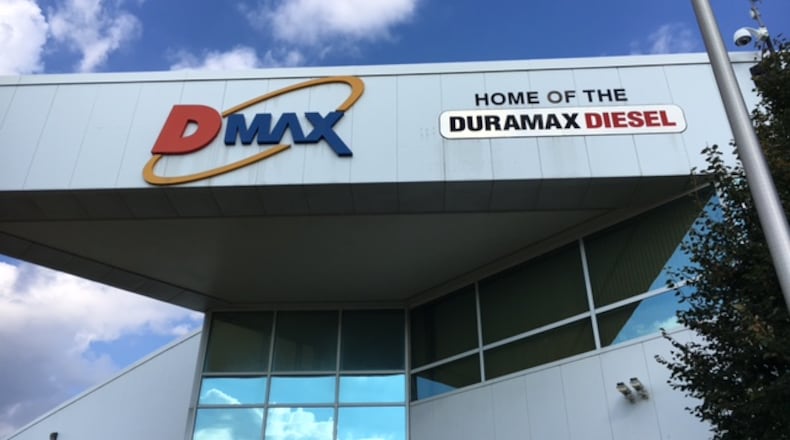There are no guarantees in the American automotive industry, but today the plant off Dryden Road seems to be in a solid place, making a product American truck buyers have embraced — the Duramax diesel engine for heavy-duty trucks.
“GM is very committed to building its truck business,” said Michelle Krebs, executive auto industry analyst with Cox Automotive.
“This is very good news,” she added. “The truck market is very strong. The outlook for it is good.”
GM announced Wednesday it will invest some $700 million to expand operations in Moraine and a pair of other Ohio cities, Toledo and Parma, creating about 450 new manufacturing jobs.
The DMAX plant is expanding diesel engine production for GM’s new heavy-duty pickups, which go on sale later this year, the refreshed GMC Sierra and the Chevrolet Silverado.
Toledo Transmission will expand production of the company’s new 10-speed automatic transmission for trucks and SUVs, GM said. And the Parma Metal Center will expand production of stamped parts and deploy laser cell welding technology.
No precise breakdown of the investment has been made public yet, but a GM spokesman told this news outlet most of the new jobs will go to GM’s Toledo plant. Mike Davis, development director for the city of Moraine, and its acting city manager, said GM has not shared with the city the number of new jobs expected at DMAX.
Krebs noted that the GM-Isuzu partnership behind DMAX faces lot of competition, particularly from Fiat Chrysler’s Dodge Ram truck and Ford’s enduring F-150 pickup.
But DMAX doesn’t have lot of foreign competition, thanks to the protection of a 25-percent tariff against foreign-made pickup trucks since the 1960s, sometimes called the “chicken tax.”
The United States has had a 25 percent tariff on imports of light trucks and two-seat SUVs for more than 50 years. Arguably as a result, the truck share of the U.S. vehicle market has been above 50 percent every year since 1999, except for two years during and after the Great Recession, 2008 and 2009, according to the American Enterprise Institute in Washington, D.C.
The American import tariff on regular cars is much lower, 2.5 percent.
Said Krebs, “It shows that tariffs can work.”
And American truck brands enjoy a lot of customer loyalty, she noted. “Truck buyers are the most loyal buyers in the business, with something like 70 percent loyalty.”
Diesel engines and trucks have long been a natural combination for many truck buyers, and the relationship between GM and Isuzu is longstanding by now.
The first production Duramax engine rolled off the assembly line on July 17, 2001, a few years after the GM-Isuzu partnership was first announced.
“Diesel and trucks will be around, because there are a lot of advantages,” Krebs said.
Truck buyers like that diesel engines are relatively efficient and usually durable, offering stronger torque compared to traditional petroleum engines.
Davis isn’t surprised by the plant’s success.
“They have definitely proven their value,” Davis said. “The employee skill-set and obviously the product they have been producing for the last 20 years, it’s held up.”
“It’s a proud moment for us, that they call us home,” he added.
Leaders of the IUE-CWA Local 775 — which represents 670 DMAX hourly workers — released a statement this week saying, “We are in communication with DMAX management regarding the investment in the plant, and we will be closely monitoring further developments.”
GM also revealed Wednesday it is in talks with a Loveland producer of electric trucks, Workhorse Group Inc., on selling its Lordstown, Ohio plant, where workers once assembled the now-cancelled Chevrolet Cruze.
The Lordstown plant was doomed by the same consumer trend that has helped DMAX: A movement away from compact cars toward trucks, SUVs and crossovers.
“I find it hard to believe they will ever employ what they did before” at the Lordstown plant, Krebs said of Lordstown.
Cox Automotive Inc. is part of Cox Enterprises, which owns this newspaper.
About the Author

